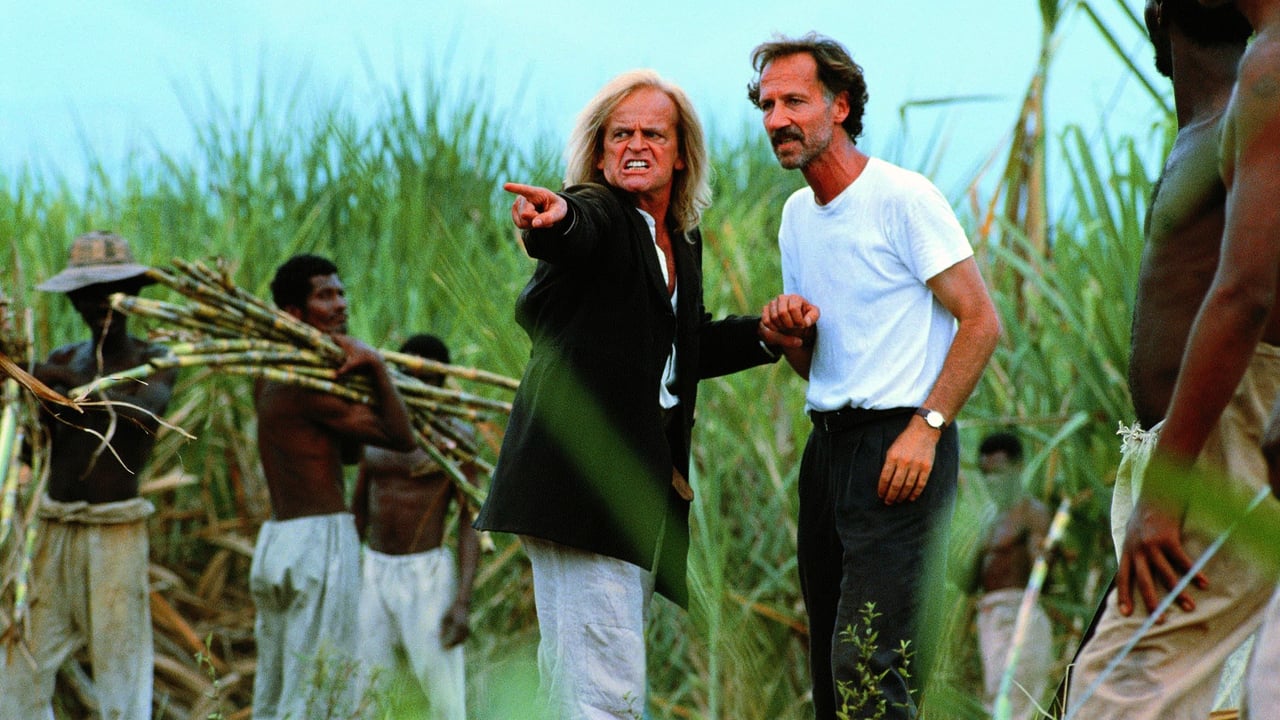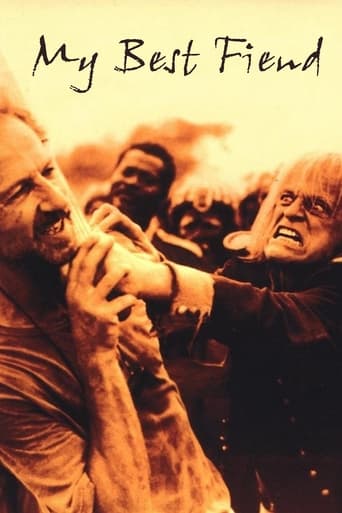

The Worst Film Ever
... View MoreAdmirable film.
... View MoreIt was OK. I don't see why everyone loves it so much. It wasn't very smart or deep or well-directed.
... View MoreExcellent characters with emotional depth. My wife, daughter and granddaughter all enjoyed it...and me, too! Very good movie! You won't be disappointed.
... View More"Mein liebster Feind" or "My Best Fiend" is a West German documentary film from 1999 and writer and director closed the old millennium on a very personal and very convincing note with this 95-minute film here. The main character of this film is occasionally listed as well in the title. It is the blonde acting infant terrible Klaus Kinski. He had already been dead for five years when this movie was made and it is somehow Herzog's farewell to his longtime collaborator. The duo worked together on a handful of film's that are widely considered among the finest from Herzog's and Kinski's bodies of work. Watching this film we find out that Herzog also brought a certain deal of insanity himself that helped him with coping of the character that was Kinski. And of course, Herzog also brought a great deal of dedication and this becomes obvious in several scenes here. One would be when Herzog tells us in one scene how Kinski was so angry he was about to leave the set and not return in the middle of filmmaking, when Herzog grabbed a gun and told Kinski he would not get very far before Herzog puts eight bullets in Kinski's head and one in his own. This part describes the documentary very well. A lot of it is about the creative clashing between the two protagonists and how insanity was always very close to genius in their cases. Herzog plays a big role of course as he is narrating this one and his fate is linked closely to Kinski's, but you never feel that this documentary is about anybody else than Klaus Kinski.Herzog travels to all kinds of places where he and Kinski worked together in the past, especially film locations, but also to places that just united him in a different manner. One example for the latter would be the apartment in the very first scenes. Herzog tells us how he kept verbally abusing everybody in there when he lived in this apartment and how he destroyed the bathroom in his rage and attacked a journalist. The journalist called Kinski excellent and Kinski lost it and attacked the man saying he was not excellent he was God-like. So yeah, this is a recurring theme in here. Kinski was an egomaniac of the worst kind and Herzog keeps mentioning scenario in which Kinski proved it again and again. There are also interviews with people Kinski acted together in Herzog's films, such as Eva Mattes and Claudia Cardinale. These two describe a very different Klaus Kinski, a sensitive, fragile man who was very shy at times. Maybe this is what Kinski was like towards his female co-actors. But it somehow fits and I almost never had the expression that Herzog or anybody else was making things up in here although Herzog easily could have taking into account how a great storyteller he is.All in all, this was a tremendous documentary I think. It told us in detail about the extremes that made Kinski such a unique character and actor. And you have to decide for yourself if this was a good or bad thing. Nobody probably could have told it better than Herzog because of all the time the two spent together and the film is a mix of current (well from 1999) video recordings and old recordings that show Kinski in action, for example how he attacks crew members or also scenes from his one-man stage performance as Jesus. We find out that Kinski often did not manage to get out of character in time for future projects and the attacks I just mentioned frequently happened when he did not learn his lines properly, so he would try to blame other uninvolved people to hope nobody recognizes his failures. Of course, this documentary was made before these accusations about pedophilia and incest from one of his daughters, which put the character into an entirely different light if these are true. I think it is impossible to separate the private person Klaus Kinski from the actor Klaus Kinski, but maybe this is the reason that allowed him to reach great high and give stunning performances again and again. I don't know. But I do know that I highly recommend these slightly under 100 minutes. A must-see for everybody who likes Kinski and/or Herzog.
... View MoreWerner Herzog and Klaus Kinski were like a couple. A very weird, loud, crazy and completely insane one, but while they fought quite a lot, it looks like they actually loved to be together. This documentary does make a wonderful double bill with "Jesus Christ Saviour" (or "JC Erlöser" as it is called in Germany). Of course you should watch the other documentary first and then this one. Hopefully being aware of the body of work Kinski and Herzog have produced together, too.It is even more obvious that those two were meant to find each other. One as crazy as the other. The documentary at hand, might only show Kinskis crazy side (and with Kinski gone, when this was made, he had no chance to comment), but to work with such a mad man, one had to be mad himself. A fascinating look behind the scenes of a couple of movies and possibly the most intimate and fascinating Kinski portrait, you'll ever see
... View MoreThis is an interesting documentary, at least for those like myself who have seen and are fans of the cycle of films starring Klaus Kinski and directed by Werner Herzog, who helms this largely autobiographical and highly subjective documentary as well. It retraces the steps of their friendship to unlikely places such as a boarding house in Germany where Kinski shared lodgings with the adolescent Herzog and his family. It follows the production of each of the 5 films Herzog and Kinski made together in order, spending perhaps 15 or 20 minutes on each.There is some very fascinating footage here from the filming of both "Aguirre: The Wrath of God" and "Fitzcarraldo", the duo's most impressive collaborations. Also Herzog interviews various co-stars such as Claudia Cardinale (who recalls an odd episode where Kinski became very frustrated with a small animal) and Eva Mattes (who brings up a poignant story about Kinski mentoring her in a moment of distress while filming "Woyzchek"). Herzog travels to some of the locations where they filmed in South America and recalls Kinski's sometimes extravagant demands.A lot of interesting aspects of Kinski's craft emerge, such as his way of entering the frame with a swivel to avoid showing the side of his profile, and his seemingly unstoppable need for drama. But the film on the whole is about Herzog and Kinski working together, not about Kinski himself. It's about a work relationship and a friendship, and if we're to believe Herzog the two of them sat together thinking up insults of Herzog for Kinski's autobiography. There have been many great collaborations in cinema, but few where the two artists so often attempted to anger or even kill each other. Herzog and Kinski seem to have seen each other as insufferable egomaniacs, and Herzog describes how Kinski would create tension on the set to ensure that all attention was focused on him. At times Herzog says that he instigated arguments with Kinski because it was the only way to get Kinski's energy down to a level appropriate for the character, specifically on "Aguirre." And Kinski's anger, which we witness in more than one filmed tirade, is indeed a thing of terror and strange beauty.Fascinating film for fans, and I even suspect that those with no familiarity at all with these films will want to seek them out afterward.
... View MoreAt the onset, I found this to be a terrifically annoying film since all the interviews for this film were dubbed into English BUT the film clips were never dubbed or subtitled! So, in some interesting looking scenes, I was simply left guessing what was happening. And, in the beginning, when Klaus Kinski is having a HUGE tantrum, you have no idea what he's saying or the context--you just see a man screaming and yelling for no apparent reason.Now as for the film, it is a posthumous biographical film by famed director Werner Hertzog about his frequent leading man, Klaus Kinski who had died in 1991. Now it's obvious from the start by watching clips of Kinski behind the scenes that he was a violent, angry and seriously disturbed individual--highly reminiscent of such insanely angry directors David O. Russell and Troy Duffy. However, while Hertzog calmly talks about how awful Kinski was, you get the idea that he's not exactly being objective and the film is more a chance for him to air his hatred of the man. It's interesting because both men hated and loved and needed each other. One wonders if perhaps the seething energy between them might have actually been the results of latent homosexual feelings! It really does make you wonder and is an interesting theory! Watch the film with this in mind, and much of it makes more sense.Herzog seems to also strongly imply throughout the film that he was the "normal one" and talks calmly again and again at how horrible Kinski was and how everyone sided with him and hated Kinski. Yet, they worked together again and again, so you are left wondering if both men are crazy--having an odd shared psychotic disorder (an actual DSM-IV psychiatric diagnosis, by the way). This is especially likely since Herzog COULD have worked without Kinski and because the "normal" Herzog was renowned for some of the most bizarre and over-the-top on location shots in film history. AGUIRRE, THE WRATH OF GOD and FITZCARRALDO are both legendary because of stories of the excesses and tensions on the set.As a result of this unintentional view of Herzog, I actually found the film to be far more interesting in my insights into him! Sure, Kinski was a volatile nut....but after a short time this becomes a bit boring because it's just too easy to cast stones at this idiot as he tantrums and bullies. But why Herzog went to all the trouble and expense to construct a documentary that talks about how awful Kinski was--THAT'S what's really interesting to me. A bizarre sado-masochistic relationship that Herzog seems the last to acknowledge. Interesting throughout--a great portrait of some sick people!
... View More